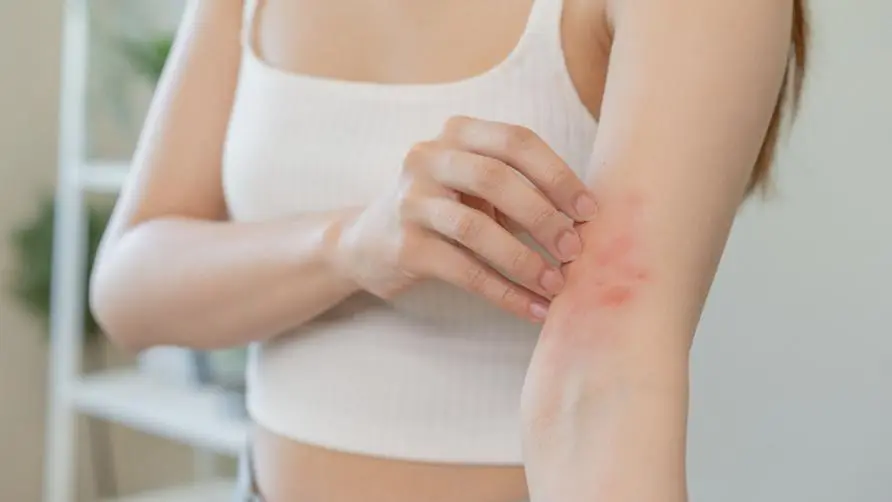Skin diseases that cannot be cured are caused by "eating the wrong food"? Nutritionist reveals "10 types of diet" that make eczema symptoms worse

Skin diseases that cannot be cured are caused by “eating the wrong food”? Nutritionist Reveals “10 Diets” That Make Symptoms Worse
The weather has turned warm and cold recently. Is it more likely that skin diseases will break out when the seasons change? Many patients with eczema and psoriasis suffer from recurring symptoms and itchy skin that affects their daily routine. Little do they know that ingesting certain “landmine foods” may be poisons that cause sensitive constitutions. Nutritionist Gao Minmin reminded on the social media that if skin symptoms always recur and cannot be cured, you should pay more attention to avoid the following 10 categories of foods for a period of time:
Hot fruits: mango, lychee, durian, longan, etc.
The above-mentioned fruits are classified as “hair-producing substances” in traditional Chinese medicine and can easily promote the secretion of histamine and cause skin sensitivity.Saturated fats: red meat, processed meat, dairy products, roasted ghee, etc.
Red meat, processed meat, dairy products, roasted ghee, etc. **can easily develop an inflammatory constitution, so it is recommended to avoid them.Solanaceae: eggplant, bell pepper, potato, tomato, etc.
Solanaceae foods and their products contain solanine, which may cause discomfort to some groups.Crustacean seafood: shrimp, crab, lobster, etc.
Crustacean seafood contains “helical structural proteins” that can easily cause allergic reactions in some groups. **If you want to avoid reducing this type of protein, you can use steaming, roasting and other cooking methods.Desserts and pastries: desserts, pastries, fried foods, etc. It is very easy to cause inflammatory reactions in the skin and the whole body and aggravate skin sensitivity. **Patients with psoriasis or eczema should avoid it as much as possible.
Fermented foods: bread, Western pastries, steamed buns, etc. Contains a large amount of baking powder and high histamine content, which can easily trigger allergic reactions in the body.
Gluten: barley, oats, rye, wheat, etc.
If you have allergies or celiac disease, you should avoid any gluten-containing foods such as barley, oats, rye, and wheat.Food additives: MSG, artificial colors, preservatives, etc.
Processed foods where the original food cannot be seen contain MSG, artificial colors, or preservatives added to prevent food from oxidizing, deteriorating, and spoiling, which can easily cause chronic inflammation of the body and cause sensitive muscles or skin sensitivities.Bad habits: cigarettes, alcohol
Bad habits such as cigarettes or alcohol can easily lead to over-irritation of the skin, causing repeated itching of the skin and even worsening the symptoms.Tonic medicinal materials: Antrodia camphorata, Cordyceps sinensis, etc.
Tonic medicinal materials such as Antrodia camphorata, Cordyceps sinensis and other supplements can easily make the skin dry and hot. **Patients with skin diseases should consider taking supplements.
A must-read for patients with eczema and psoriasis! Develop these habits to avoid worsening of symptoms
In general, hypersensitivity nutritionists recommend that patients with eczema or psoriasis should stay away from foods they are allergic to and change their bad living habits to avoid worsening of skin symptoms. Patients are advised to follow the following lifestyle or dietary measures to help improve the severity of the disease:
Keep your diet simple, pay attention to balance, and eat more original foods. In particular, natural fruits and vegetables are rich in phytochemicals, which have a protective effect on the human body and can reduce chronic inflammation.
The supplement of probiotics and prebiotics can help balance the immune system and reduce allergies. An intestinal environment with more good bacteria and fewer bad bacteria can keep the intestinal mucosa intact and reduce the chance of allergies. You can usually create a good intestinal flora by consuming yogurt or yogurt, combined with a large amount of fruits and vegetables.
Avoid obesity and control ideal body weight. Obese body is also an inflammatory body, so you only need to be 80% full when eating.
Get some sun exposure and supplement vitamin D. Supplementing vitamin D through sun exposure can reduce inflammation. You can also use dried mushrooms, egg yolks and other foods to supplement vitamin D.
Get enough sleep and don’t stay up late. It is also important to eat well, sleep well, and relax. Avoiding overexertion can slow down the symptoms of psoriasis.
Pay attention to skin moisturizing. Dehydration of the body will reduce the water-holding capacity of cells, making the skin more dry, sensitive and itchy. It is recommended to apply lotion after bathing to enhance moisturizing and avoid itching.
Wear more cotton clothing. Usually wear loose and soft clothes.
Avoid stress and burnout. Fatigue and stress can weaken immunity and worsen skin conditions. It is recommended that in addition to getting enough sleep, you also learn to moderately relieve stress and stay in a happy mood.
Control the ambient temperature and humidity. An excessively dry or humid environment will aggravate the condition.
Seek medical treatment early and keep following up. In serious cases, seek medical treatment as the fastest and most effective method.
Further reading:





